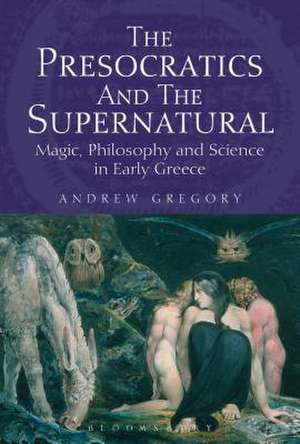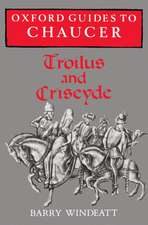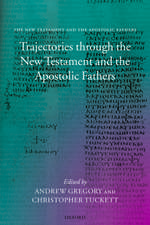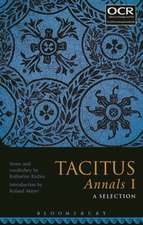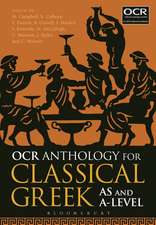The Presocratics and the Supernatural: Magic, Philosophy and Science in Early Greece
Autor Andrew Gregoryen Limba Engleză Paperback – 22 apr 2015
| Toate formatele și edițiile | Preț | Express |
|---|---|---|
| Paperback (1) | 258.42 lei 6-8 săpt. | |
| Bloomsbury Publishing – 22 apr 2015 | 258.42 lei 6-8 săpt. | |
| Hardback (1) | 891.92 lei 6-8 săpt. | |
| Bloomsbury Publishing – 23 oct 2013 | 891.92 lei 6-8 săpt. |
Preț: 258.42 lei
Preț vechi: 295.88 lei
-13% Nou
Puncte Express: 388
Preț estimativ în valută:
49.46€ • 51.44$ • 40.83£
49.46€ • 51.44$ • 40.83£
Carte tipărită la comandă
Livrare economică 15-29 aprilie
Preluare comenzi: 021 569.72.76
Specificații
ISBN-13: 9781474234771
ISBN-10: 1474234771
Pagini: 296
Dimensiuni: 156 x 234 x 25 mm
Greutate: 0.41 kg
Editura: Bloomsbury Publishing
Colecția Bloomsbury Academic
Locul publicării:London, United Kingdom
ISBN-10: 1474234771
Pagini: 296
Dimensiuni: 156 x 234 x 25 mm
Greutate: 0.41 kg
Editura: Bloomsbury Publishing
Colecția Bloomsbury Academic
Locul publicării:London, United Kingdom
Caracteristici
Original examination of presocratic thinkers' views in relation to magic and religion
Notă biografică
Andrew Gregory is Reader in History of Science in the Department of Science and Technology Studies, University College London, UK. He is the author of many books on the science of the ancient world, including Plato's Philosophy of Science and Ancient Greek Cosmogony.
Cuprins
Introduction Natural and SupernaturalThe Literary and Philosophical BackgroundMagic and Its Practice in Presocratic GreeceMilesian PantheismXenophanes and the Drive Towards a Unitary GodThe Hippocratics and the Sacred DiseaseEmpedoclesThe Pythagoreans Leucippus and DemocritusConclusionNotesBibliographyIndex
Recenzii
Overall, Gregory provides a thorough introduction to the debates on Presocratic naturalism. He successfully shows that, in many instances, what may seem at first glance to be supernatural was actually carefully integrated into a naturalist conception of the world. His inclusive approach should be particularly invaluable for those who have not yet ventured beyond the confines of the standard philosophical canon.
This work studies a neglected aspect of Presocratic thought: how did the naturalistic approach deal with allegedly supernatural and magical entities and events? Through a careful analysis of the sources, Gregory shows how the divine and numinous were not necessarily banished, but were often accommodated within a naturalistic framework of explanation.Gregory invites us to rethink standard categories of philosophy, religion, science, and magic and consider new conceptual connections.
This study of the supernatural in early Greek philosophy focuses a clear beam of light on the obscure boundary between science and religion in the period. Informed and sensitive historical imagination is brought to bear on the relation between scientific or rational accounts of nature and their clash with inherited notions of the gods. Without forcing the material into a crude narrative of scientific progress, Gregory argues that the first Western philosophers did target certain inherited religious notions, but that the lack of a unified conception of nature allowed far more diverse and subtle responses to the divine than a simple rejection. Sensitivity to that diversity is a central strength of the work.
Andrew Gregory's book is a clear and sympathetic treatment of the current debates about naturalism, supernaturalism, and scientific rationalism in early Greek thought. Well-written and carefully structured, its non-polemical arguments and explanations are useful for students of Greek philosophy and of the history of ancient science, medicine, and mathematics. The volume is an admirable supplement for courses in any of these areas, and a fine introduction to the issues for the general reader.
This work studies a neglected aspect of Presocratic thought: how did the naturalistic approach deal with allegedly supernatural and magical entities and events? Through a careful analysis of the sources, Gregory shows how the divine and numinous were not necessarily banished, but were often accommodated within a naturalistic framework of explanation.Gregory invites us to rethink standard categories of philosophy, religion, science, and magic and consider new conceptual connections.
This study of the supernatural in early Greek philosophy focuses a clear beam of light on the obscure boundary between science and religion in the period. Informed and sensitive historical imagination is brought to bear on the relation between scientific or rational accounts of nature and their clash with inherited notions of the gods. Without forcing the material into a crude narrative of scientific progress, Gregory argues that the first Western philosophers did target certain inherited religious notions, but that the lack of a unified conception of nature allowed far more diverse and subtle responses to the divine than a simple rejection. Sensitivity to that diversity is a central strength of the work.
Andrew Gregory's book is a clear and sympathetic treatment of the current debates about naturalism, supernaturalism, and scientific rationalism in early Greek thought. Well-written and carefully structured, its non-polemical arguments and explanations are useful for students of Greek philosophy and of the history of ancient science, medicine, and mathematics. The volume is an admirable supplement for courses in any of these areas, and a fine introduction to the issues for the general reader.
Descriere
This book explores evidence of astrology, mysticism and other elements of the supernatural in presocratic Greek thought.
